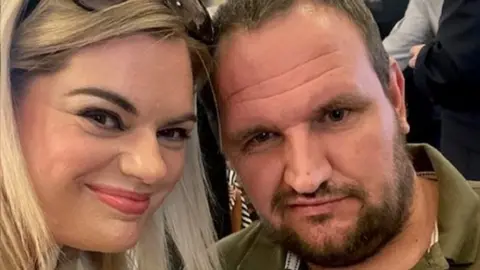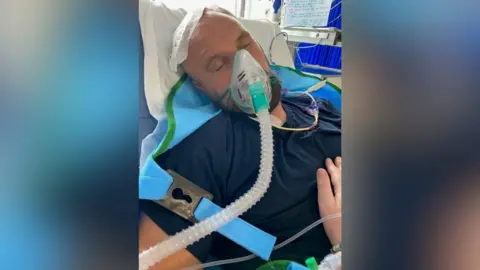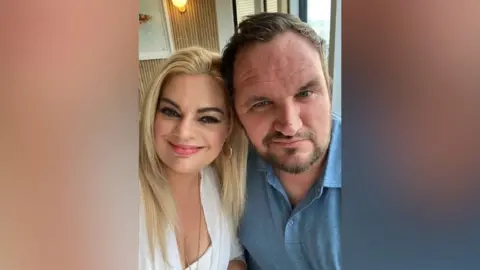Every single stroke survivor in the world is abandoned by the system. Your stroke medical 'professionals' have incompetently not even been trying to get stroke solved to 100% recovery!
Stroke survivor left 'abandoned' by system
 Caroline Cooke
Caroline Cooke The wife of a man who suffered a stroke in August 2020 said they were ill-prepared for the range of problems that followed.
Matt Cooke was left with a range of disabilities and his wife, Caroline, became his carer.
The couple, from Lisburn, described the initial support as "amazing" but said it didn't last long enough.
The Department of Health (DoH) said the pace and delivery of services had been impacted by budget constraints.
Matt Cooke was 40 when, without warning, he found he could not walk, felt disorientated and confused.
His wife called 999 and noticed his face was drooping, one of the signs of stroke.
'Nobody prepared us'
 Caroline Cooke
Caroline CookeMr Cooke spent more than six months in hospital.
He lost the use of his left arm, suffered cognitive problems and was unable to return to work as a joiner. His wife became his carer, and had to reduce her hours at work.
The couple also had to move in with Mrs Cooke's parents for three years for extra support but have since moved back to their own home.
Mrs Cooke said the system was "very disjointed".
'We were fighting the system'
"There wasn't that much support like, here's what to expect, here's what's going to happen - here's what it's going to be like - nobody prepared us," she added.
Mrs Cooke said the occupational therapy and physiotherapy units had been "fantastic" but more needed to be done.
She said there needed to be more "joined up help" for people in the rehabilitation phase.
"It felt like we were fighting the system.
"If you don't ask for help nobody is checking on you. Nobody offers the support," she added.
 Caroline Cooke
Caroline CookeWhile life has improved over the four years since the stroke happened, Mrs Cooke said "it could be better still".
The couple, through the Stroke Association's Thriving After Stroke campaign, are now calling for more support for stroke survivors and their families.
Alasdair O'Hara, the charity's Northern Ireland director, said the Crooke's story was all to typical.
"Despite being a vital part of the stroke care pathway, long-term, life after stroke support, including emotional and psychological support, is often overlooked when it comes to budgets and workforce planning," he added.
"As well as ensuring that people have the support they need to aid their recovery, investing in and improving life after stroke support would deliver huge benefits to the health and social care system and the economy."
The DoH said that whilst "capacity and funding constraints have impacted the pace of delivery" progress had been made.
This includes the introduction of artificial intelligence software in five hospitals to help interpret scans and develop specific rehabilitation and long-term support for stroke survivors.
The DoH said the pace at which action can be taken is dependent on the budget and it is estimated that £9.7m of recurrent funding is needed for 2024/25 to progress the priorities set out in its Stroke Action Plan.
No comments:
Post a Comment